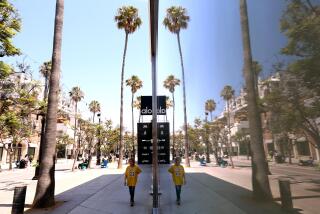CSUN Releases Impact Report on Proposed Mall
- Share via
NORTHRIDGE — Cal State Northridge took a major step toward completing a novel and controversial partnership with private business Monday when it released the draft environmental impact report for a shopping center proposed for the north end of campus.
The University MarketCenter, a private development that would be built on 20 publicly owned campus acres, would dramatically increase traffic and create other problems in the area, according to the report, but none that could not be mitigated to acceptable levels with proper planning and construction, it said.
In the end, the thick document offers few surprises to those who have followed the project. And by late Monday at least, it had changed few minds.
“During a time of shrinking state financial support for higher education coupled with rising enrollment demands, the University MarketCenter will ensure a stable, long-term source of funding--up to $1 million per year--to enhance campus programs,” CSUN President Blenda J. Wilson said in a prepared statement.
Jim East of the Granada Hills Chamber of Commerce holds a different point of view. “This is state . . . land on the only [public] university that we have in the San Fernando Valley,” East said. There are “better uses for it, with better educational ties, than a mall,” he said.
The 220,000-square-foot complex, to be located on the south side of Devonshire Street between Lindley and Zelzah avenues, is CSUN’s answer to Gov. Pete Wilson’s call for state universities to develop financial and educational partnerships with private enterprises.
First proposed in 1996, the MarketCenter would likely include an upscale grocery store, a bookstore and a computer electronics store, among other retail outlets. Envisioned by the university and the developer, Newport Beach-based Hopkins Real Estate Group, as a well-groomed, well-lit, Mediterranean-style shopping area, the center would also offer a food court, a small conference center and an open space where student performers could entertain noontime crowds.
It would provide more than 300 jobs--many filled by CSUN students, the university says--as well as dozens of internships.
As with many Southern California commercial developments, traffic congestion is at the top of the list of adverse impacts, according to the report.
With 929 parking spaces, the complex is likely to lure enough customers to clog intersections in the mostly residential area unless changes are made, the report concludes.
Traffic at four of those intersections--Reseda Boulevard and Devonshire, Reseda and Lassen Street, Zelzah and Devonshire, and Zelzah and Nordhoff Street--could be kept moving if the city’s Automated Traffic Surveillance and Control systems are installed, the report says.
Two other intersections--Zelzah and Lassen, and Balboa Boulevard at Devonshire--should be widened.
Other potential problems include noise and dust during the construction of the center, but work hours would be limited and contractors would be required to water dusty areas, wash departing trucks and “use power construction equipment with state-of-the-art noise-shielding and muffling devices.”
As for aesthetics, the project would do far more good than harm in the mostly undeveloped area, according to the report. Indeed, the document concludes: “In general, the project would represent substantial improvement in the aesthetic appearance of the project site.”
A public hearing on the draft EIR will be held Thursday, March 27 at 7 p.m. in the Northridge Center of the Student Union.
More to Read
Sign up for Essential California
The most important California stories and recommendations in your inbox every morning.
You may occasionally receive promotional content from the Los Angeles Times.










